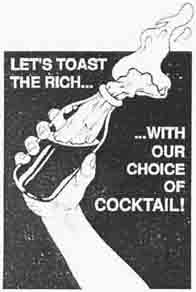| Against Authority | page 88 |
|
Movements and Class Warfare
The terrorism of "propaganda of the deed" had a terrible backlash that basically killed anarchism for nearly half a century. In the United States, the assassination of McKinley and subsequent anarchist deportation laws, the popular hatred for "bomb-throwing anarchists," and antipathy for immigrants (who filled the ranks of violent socialist anarchist groups) led to Tucker's immigration to France and Emma Goldman's deportation to Russia. The anarchists, both individualist and socialist, had been effectively dispersed by 1920, and thoughtful proponents of anarchism became almost extinct.
There did remain some labor movements which called themselves anarchist. In Spain, there was the Confederacion Nacional del Trabajo (CNT); in the US there were the "Wobblies" - the International Workers of the World. But these were not authentic anarchist groups in the strict sense - they were socialist pro-labor groups with some anti-statist proclivities. They had Bakunite revolutionary anti-capitalist sentiment and stressed the class-war paradigm, but were weak on the fundamental principle of anarchism - opposition to the state. Indeed, these groups were not above using state power to achieve their ends, endorsing political candidates, and using Marxian means that Bakunin would have abhorred.

On the other hand, internally these organizations tended to favor "rank and file" bottom-up organization, and they were relatively less politically oriented than the more mainstream unions of the time. They were much more likely to engage in direct action rather than beg or petition rulers. Thus, while these movements and groups could not be called anarchist, failing to satisfy the third anti-statist criteria in our definition, they could reasonably be considered quasi-anarchist.
The most prominent and popular movement was anarcho-syndicalism. Ardently anti-capitalist, they expoused the divisive collectivist class-war mythology, wherein individuals, by virtue of simply falling into a conceptual class, are deemed to have certain fixed interests. Such stereotyping is certainly not conducive to critical thinking, and it is questionable whether it is even good propaganda.